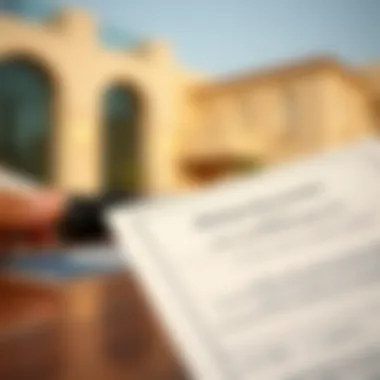Understanding UAE Mulkiya: Ownership Documentation in Dubai


Intro
The real estate landscape in Dubai has been likened to a bustling bazaar, with opportunities lying around every corner. Stepping into this market, potential buyers, investors, and property managers soon find that understanding the foundational documents governing ownership is critical. Among these, the Mulkiya stands out as a cornerstone, offering not just a title but a sense of security in property dealings.
In the heart of this vibrant market, the Mulkiya is more than just a piece of paper; it represents legal ownership and the assurance that one’s investment is protected under UAE law. Without it, potential property buyers might find themselves lost in a maze of legalities and regulations, which can be as confounding as a jigsaw puzzle missing a few pieces.
By exploring the significance of the Mulkiya, we aim to illuminate the complexities behind property ownership in Dubai. From its issuance process to its implications during property transactions, this guide delves deep into the nuances that agents, investors, and homeowners must grasp to weave their way through the intricate tapestry of Dubai’s real estate market.
Keep reading as we dissect the market trends and investment strategies that will help you navigate the choppy waters of property ownership with confidence.
Preamble to UAE Mulkiya
In the bustling real estate landscape of Dubai, understanding the nuances of property ownership documentation is crucial. One of the cornerstone documents in this realm is the Mulkiya. This article sets out to uncover the intricacies of Mulkiya and its vital role in establishing legal ownership of properties in the UAE. As Dubai continues to attract investors and homebuyers from around the globe, having a firm grasp of what Mulkiya entails becomes all the more important for anyone involved in property transactions.
Definition and Purpose of Mulkiya
The term Mulkiya refers to a property ownership certificate that serves as the official proof of ownership in Dubai. More than just a piece of paper, it embodies the legality of one’s claim to a property and is essential during any sale or transfer of ownership. This document is issued by the relevant governmental authority, typically the Dubai Land Department, ensuring that ownership is recorded in accordance with local laws.
The purpose of having a Mulkiya is multifaceted. It not only secures the holder's rights over the property but also streamlines transactions by establishing a clear line of ownership. Buyers feel safer knowing that the document is in place, thus reducing potential disputes over property claims. In addition, having a Mulkiya can be a key factor in accessing certain services, such as bank mortgages or insurance for the property, thereby making it an indispensable asset for property owners in Dubai.
Historical Context of Property Ownership in Dubai
To fully appreciate the significance of Mulkiya today, one must delve into the historical context of property ownership in Dubai. Real estate transactions in the UAE have roots that go back several decades. Initially, the concept of property ownership was nebulous, with many transactions occurring through informal agreements and verbal understandings.
As Dubai developed into a global hub for commerce and tourism in the late 20th century, there was a pressing need to formalize property ownership to attract foreign investment. In 2002, significant legislative changes were introduced, allowing non-UAE citizens to own property in designated areas. This shift prompted the establishment of a more structured system of ownership documentation, thus paving the way for the Mulkiya.
By implementing this coherent framework, Dubai sought to bolster investor confidence while fostering a vibrant real estate market. Today, the Mulkiya stands as a testament to the emirate's evolution and growing sophistication in property management, providing assurance to both local and international stakeholders in the real estate arena.
"The Mulkiya is not just a legal requirement; it is the foundation upon which trust in property transactions is built within Dubai's dynamic real estate market."
Understanding the evolution and significance of Mulkiya equips stakeholders with the knowledge necessary to navigate Dubai's property market. As such, this insightful document continues to serve as an essential tool for all involved in property ownership and transactions.
The Importance of Mulkiya in Dubai's Real Estate Landscape
Mulkiya is more than just a piece of paper; it’s a cornerstone for anyone looking to navigate the bustling real estate market in Dubai. In a land that has seen rapid development and transformation, understanding the importance of Mulkiya provides a clearer picture of property ownership and its legalities. The certificate serves as the official recognition of ownership, a necessity for safeguarding interests in a market that is otherwise fraught with complexities.
Legal Implications of Ownership Recognition


First and foremost, having a Mulkiya means legal recognition of ownership. It is crucial for establishing claim over property. Without it, any transaction risks becoming void. For instance, imagine purchasing a luxury apartment in Downtown Dubai, but lacking the Mulkiya that confirms your ownership. You could find yourself entangled in disputes, possibly losing both the property and your investment.
Additionally, the Mulkiya is not just a document; it's a shield against potential ownership claims. If someone else comes forward claiming they own the property, having that official document can make all the difference. The legal implications are far-reaching. Not only does it legitimize a property owner’s claim, but it also reassures potential buyers and investors about the security of their investment. For international investors, particularly, understanding this is paramount and simplifies transactions considerably. The Mulkiya acts as an entry ticket into the property market, giving investors the green light to proceed with their financial commitments.
Role in Property Transactions
The role of Mulkiya in property transactions cannot be overstated. This document plays a pivotal role when it comes to buying, selling, or even leasing properties in Dubai. It is often the first document demanded by real estate agents during a transaction, setting the stage for negotiations and contracts.
When purchasing a property, the buyer usually requires the Mulkiya to verify ownership before moving forward. Without it, the reality is that getting financing or even closing a deal can be an uphill battle.
Moreover, for landlords, having the Mulkiya is essential for enforcing lease agreements. If disputes arise regarding tenant obligations or property upkeep, this document acts as an authoritative reference point in legal proceedings. In short, the Mulkiya doesn’t just help in initiating transactions; it also provides a safety net throughout the ownership term.
On a practical level, understanding the Mulkiya adds a layer of confidence in navigating a transaction. For homebuyers venturing into the market for the first time, it eases worries about potential fraud. Knowing that a document represents your ownership stakes makes the whole experience much more manageable.
"In the intricate web of Dubai’s real estate, Mulkiya stands as a beacon of security and authenticity for property owners."
Procedure for Obtaining a Mulkiya
The procedure for obtaining a Mulkiya is not just a bureaucratic hurdle; it acts as a gateway into Dubai's real estate ecosystem. This document, which certifies property ownership, is fundamental for both locals and expatriates. Having a clear understanding of the application process is essential, as navigating through it can save time, money, and headaches later on. Knowing what to expect and how to prepare can make a significant difference in ensuring accurate and swift acquisition of this document.
Initial Steps in the Application Process
To kick off the journey toward obtaining a Mulkiya, one must embark on a series of initial steps that lay the groundwork for a successful application. First and foremost, understanding the boundaries of the property is crucial. Potential applicants should verify property ownership through official channels, such as Dubai Land Department records.
Next, ensure you have a keen eye on timelines; timing can be everything when dealing with real estate. Schedule an appointment with the relevant authorities. This usually involves a visit to the Dubai Land Department or a registered property service agent. Initially, getting this appointment might feel like chasing your own tail, but organizing paperwork ahead will ease the process.
After getting the appointment, be prepared to meet specific requirements, such as proof of identity and legal ownership documents. Have everything at your fingertips; that means gathering not only personal identification but also receipts or confirmations of completed real estate transactions that are related to the property in question. It's easy to forget small details, but those small things can be the difference between a smooth process and a drawn-out saga.
Required Documentation for Mulkiya Application
When it comes to the required documentation for a Mulkiya application, it can feel a bit like trying to solve a jigsaw puzzle without the picture on the box. However, it doesn't have to be challenging if you know what you're looking for. Generally, applicants need the following documents:
- Identity proof: This could be a passport or an Emirates ID, depending on your residency status.
- Ownership documents: These include the agreement of purchase or a sales contract that clearly states the applicant is the rightful owner.
- Property Title Deed: If applicable, this ties everything back to the original property listings.
- No Objection Certificate (NOC): Especially from developers or governing bodies confirming there are no existing dues or liabilities concerning the property.
The idea here is to ensure that all documentation is both accurate and verifiable. Any discrepancies could lead to months of confusion or worse, rejection of your application altogether.
Common Pitfalls in the Application Process
Even the most seasoned real estate players can trip over common pitfalls during the Mulkiya application process. One of the major hazards is neglecting to gather all required documents. It's easy to underestimate the importance of having each piece in place, but even one missing document can halt progress. Many applicants make the mistake of assuming that even though they’ve submitted significant papers, their application will be accepted.


Another frequent stumbling block is misinformation. Relying solely on hearsay or unverified sources can lead applicants astray. Regulations may shift, or requirements can change without notice, and what worked yesterday might not apply today. Always refer to the Dubai Land Department or verified real estate agents for the most accurate information.
Lastly, beware of timing. The application process can take time, and treating it as an afterthought can lead to unnecessary stress. Planning ahead with a pragmatic timeline keeps you from feeling like you’re racing against the clock as deadlines loom.
Quick tip: Always double-check your submitted forms before handing them over. A small error could lead to significant delays.
In summary, understanding the procedure for acquiring a Mulkiya is paramount for seamless navigation through the complexities of Dubai's real estate landscape. By adhering to the outlined steps and preparing the requisite documents while sidestepping typical errors, anyone can ensure their ownership is recognized properly.
Who Needs a Mulkiya?
Understanding the Mulkiya is essential for various stakeholders in Dubai's vibrant real estate market. Having this document is not just a formality; it is a safeguard that brings peace of mind and legal recognition to property ownership. Knowing who needs a Mulkiya helps streamline transactions and minimizes disputes.
Property Owners and Investors
For property owners and investors, a Mulkiya serves as the keystone of real estate transactions. It provides legal recognition that the property belongs to them, thus acting as a shield against any potential claims from third parties. Without this document, ownership remains ambiguous, leading to an uncertain situation when wanting to sell or lease the property.
- Legality: For investors, especially foreign ones, obtaining a Mulkiya is crucial. It differentiates between legitimate ownership and mere possession. This legal document can make or break a deal, as buyers often demand proof of ownership before they commit.
- Asset Protection: The Mulkiya also protects investors from possible grievances that can arise in case of a dispute. If ownership is challenged, the Mulkiya stands as evidence of legitimacy in court.
- Resale and Leasing: When it comes time to resell or lease, having a valid Mulkiya simplifies the entire process. Buyers expect to see this document, and failure to present it can lead to a loss of trust and potential investment opportunities.
Tenants and Leaseholders
Even renters and leaseholders should familiarize themselves with the Mulkiya, as it has implications for their rights and responsibilities. Though they do not own the property, understanding this document can provide clarity in their leasing agreements and help in safeguarding their investment.
- Lease Agreements: When signing a lease, it’s beneficial for tenants to understand if the property owner has a Mulkiya. If the landlord does not possess this document, tenants may face issues regarding the legitimacy of their lease, potentially leading to conflicts down the line.
- Dispute Resolution: For leaseholders, in cases where a landlord attempts to evict without legal grounds, having knowledge about the Mulkiya can help in negotiations. It arms tenants with the knowledge they need to protect their rights.
- Long-term Security: If tenants are considering a long-term lease, verifying the existence of a Mulkiya assures them that they are dealing with a legitimate property owner. This simple check can save future hassles and allow for a more secure living arrangement.
Challenges Associated with Mulkiya
In the realm of real estate in Dubai, the Mulkiya document stands as a cornerstone for ownership verification and legal recourse. However, navigating the complexities surrounding this document can present a slew of challenges for both seasoned investors and first-time homebuyers. Understanding these hurdles is not only crucial for smooth transactions but also for preserving your investment.
Issues of Documentation and Applications
One of the primary challenges concerning Mulkiya lies in the process of documentation and submission of applications. The procedure may seem straightforward, but it can become a labyrinth of requirements if one is not well-prepared. Common issues include the misplacement of necessary documents, delays in approvals, or even misinformation regarding the required paperwork.
Key Documentation Challenges:
- Incomplete Submissions: Many applicants find themselves in hot water due to incomplete documentation. Submitting everything needed is crucial because any missing piece can delay the process.
- Shifting Regulations: The laws governing property in Dubai are fluid. As a result, what was required last year might not be the same today. Keeping abreast of these changes adds pressure to prospective owners.
- Language Barriers: For expatriates, communications regarding requirements can be daunting, especially if they are not well-versed in Arabic or complex legal jargon.
It's vital for applicants to double-check all documents and engage reliable local services to alleviate these challenges. As they say, “better safe than sorry.” Even minor oversights can result in major roadblocks down the line.
Disputes Over Ownership and Title


Ownership disputes are another sticking point in the Mulkiya narrative. Given the high stakes involved in Dubai's booming real estate market, conflicts regarding ownership and property titles are not uncommon. These disputes stem from various issues, such as ambiguous land titles or conflicting claims on the same property.
Common Ownership Dispute Scenarios:
- Misinterpretation of Title Deeds: Sometimes, different parties may interpret title deeds differently, leading to disagreements.
- Inheritance Issues: Inheriting property can also complicate ownership, especially if the deceased didn’t leave clear instructions on their estate or if there are multiple heirs involved.
- Fake Documentation: With the pressure to own property in Dubai, there have been a few shady characters trying to sell properties with forged documents. These situations can snowball quickly into legal battles.
Resolving these disputes often necessitates legal intervention, which can be both time-consuming and costly. As always, prevention is better than cure. Being thorough with research and vetting documentation prior to acquisition can save buyers heaps of trouble in the long run.
It is essential for investors and homeowners alike to understand the challenges linked with Mulkiya thoroughly. Without proper knowledge and proactive measures, one can easily find themselves in a muddle more complex than any Dubai construction site.
Future of Mulkiya in Dubai's Real Estate Market
Understanding the future of Mulkiya in Dubai's real estate market is paramount for anyone navigating the intricate web of property ownership in the emirate. As Dubai continues to develop its urban landscape and attract a diverse array of businesses and individuals, the Mulkiya increasingly stands as a cornerstone of property relations. It encapsulates the essence of ownership, ensuring that rights are recognized and transactions proceed smoothly.
Trends in Property Ownership Regulations
As regulations surrounding property ownership evolve, the significance of Mulkiya grows. In recent years, the Dubai Land Department (DLD) has introduced a slew of reforms aimed at enhancing transparency and security in property transactions. These reforms often promote a more equitable environment for investors and property buyers alike. Key trends influencing these changes include:
- Increased Compliance Requirements: New laws are being instituted that necessitate strict adherence to property ownership guidelines. This shift underscores the importance of holding a Mulkiya, as it serves as official proof of ownership.
- Streamlined Processes: There's a palpable push towards digitization of documents and processes involved in property transactions. This modernization reduces potential delays and creates a more efficient experience for individuals and businesses.
- Foreign Ownership Regulations: Various jurisdictions within Dubai are opening up to increased foreign investment. This flexibility fundamentally reshapes the landscape of how Mulkiya is issued and understood, enabling international investors to navigate with more clarity.
These trends not only reflect a broader global initiative toward more structured ownership frameworks but also directly impact how Mulkiya is perceived and utilized in everyday transactions.
Impact of Technological Advancements
Technology is swiftly revolutionizing real estate operations, and the Mulkiya is not exempt from this transformation. The advances we see today are not just a passing trend but are likely to redefine ownership documentation in fundamental ways. Some notable impacts include:
- Blockchain Technology: The incorporation of blockchain allows for secure and immutable records of property ownership. This innovation ensures that issues of fraud and forgery diminish, enhancing the credibility of the Mulkiya.
- E-Government Services: Platforms developed by the Dubai government simplify the application process for Mulkiya. With online portals and apps, property buyers can now apply for ownership documents from the comfort of their homes.
- Data Analytics: The rise of big data influences how property trends are monitored and analyzed. Insights from data can inform prospective buyers about market conditions, property values, and the potential for capital gains in specific areas, ultimately shaping how they approach the Mulkiya application.
These technological advancements signal a smart leap forward in real estate practices, ensuring that as the market matures, the systems supporting it become more robust and user-friendly.
In summary, the future of Mulkiya in Dubai's real estate market intertwines with regulatory reforms and technological innovations, creating an environment that supports better governance of property ownership while facilitating seamless transactions. This is not merely about adjusting to new laws or gadgets; it's about nurturing a highly functioning property ecosystem that benefits everyone involved.
Maintaining a keen eye on these developments will be essential for real estate agents, investors, and homebuyers who aim to stay ahead in this dynamic landscape.
Culmination
Understanding the concept and significance of the Mulkiya is pivotal for anyone navigating the Dubai real estate market. This document not only represents a formal recognition of property ownership but also serves as a critical instrument in safeguarding the rights of property owners. In an environment where investments can soar and fluctuate faster than the desert sun sets, possessing a Mulkiya provides security, ensuring that your footing in property transactions is solid.
Summarizing the Role of Mulkiya
In summary, the Mulkiya stands as a fundamental component of real estate ownership in Dubai. Without it, the legitimacy of one’s property ownership may come into question, potentially leading to disputes or loss of investment. The role of this document transcends mere paperwork; it’s an assurance of legitimacy and protection. Buyers, sellers, and investors all rely on it to navigate a landscape where trust and legal clarity are paramount. The issuance of the Mulkiya not only verifies ownership but also simplifies the process of buying and selling properties by providing a clear, recognized legal framework.
Encouraging Informed Property Transactions
With the intricacies of the Mulkiya laid bare, it becomes clear that understanding this document is essential for informed property transactions. It’s not just about having the paperwork in hand; it’s about knowing its implications and the rights it confers. Buyers who are well-informed about the Mulkiya will make smarter decisions, providing them with an edge in negotiations and ultimately enhancing their investment potential. Additionally, clarity around the implications of ownership, which a Mulkiya provides, encourages transparency in transactions.







